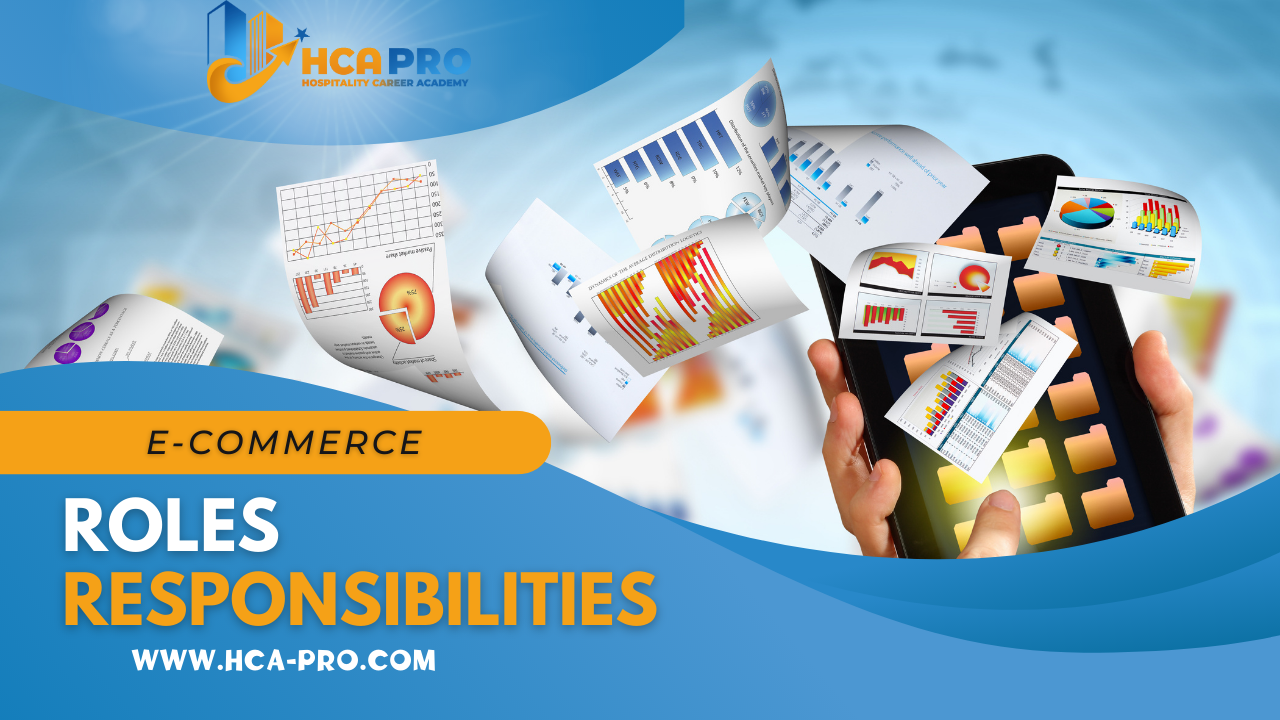
6 E-commerce roles & responsibilities for each role
What's E-commerce?
E-commerce, short for "electronic commerce," refers to the buying and selling of goods and services over the internet. It includes a wide range of online business activities, such as online retail stores, online auctions, and online financial transactions.
E-commerce has become a popular and convenient way for consumers to shop and make purchases, as it allows them to browse and buy products from the comfort of their own homes. It has also revolutionized the way that businesses sell their products and services, by providing them with a global market and the ability to reach customers around the world.
There are several types of e-commerce, including:
-
Business-to-consumer (B2C): This refers to the sale of products and services from a business to individual consumers. This is the most common type of e-commerce, and includes online retail stores such as Amazon and eBay.
-
Business-to-business (B2B): This refers to the sale of products and services from one business to another. This type of e-commerce is often used by wholesalers and manufacturers to sell their products to retailers.
-
Consumer-to-consumer (C2C): This refers to the sale of products and services by individual consumers to other consumers, typically through online marketplaces such as eBay or Craigslist.
-
Consumer-to-business (C2B): This refers to the sale of products or services by individual consumers to businesses, such as freelance services or products sold on Etsy.
E-commerce has grown significantly in recent years and is expected to continue to do so in the future. It has transformed the way that businesses and consumers interact and has created new opportunities for commerce and trade around the world.
E-commerce roles and responsibilities
E-commerce roles and responsibilities can vary depending on the size and nature of the business, but some common roles and responsibilities in an e-commerce setting include:
-
E-commerce Manager: The e-commerce manager is responsible for overseeing the overall operation of the online store and ensuring that it is running smoothly. This may involve managing a team of e-commerce coordinators and overseeing the development and execution of the e-commerce strategy.
-
E-commerce Coordinator: The e-commerce coordinator is responsible for managing the day-to-day operation of the online store, including managing product listings, processing orders, and handling customer inquiries.
-
Customer Service Representative: The customer service representative is responsible for interacting with customers and providing support and assistance with any issues or questions they may have. This may involve responding to customer inquiries via phone, email, or social media.
-
Marketing Specialist: The marketing specialist is responsible for developing and implementing marketing strategies to promote the online store and drive traffic and sales. This may involve creating and managing advertising campaigns, email marketing campaigns, and social media campaigns.
-
Inventory Specialist: The inventory specialist is responsible for managing the inventory of the online store, including tracking stock levels and ensuring that products are available for purchase. This may involve coordinating with suppliers to restock inventory and fulfilling orders.
-
Shipping and Logistics Coordinator: The shipping and logistics coordinator is responsible for managing the fulfillment of orders and ensuring that they are delivered to customers on time. This may involve coordinating with third-party shipping companies and tracking shipments.
E-commerce responsibilities for each role
E-commerce Manager roles and responsibilities:
The roles and responsibilities of an e-commerce manager may vary depending on the specific needs of the business, but some common duties and responsibilities of an e-commerce manager include:
-
Developing and implementing the e-commerce strategy for the online store, including setting sales and revenue targets
-
Managing and overseeing the operation of the online store, including managing product listings, processing orders, and handling customer inquiries.
-
Working with the marketing team to develop and implement marketing strategies to promote the online store and drive traffic and sales.
-
Coordinating with the inventory specialist to manage stock levels and ensure that products are available for purchase.
-
Monitoring and analyzing the performance of the online store, using data and analytics to identify areas for improvement and make adjustments as needed.
-
Managing a team of e-commerce coordinators and other staff members, providing guidance and support to ensure that they are able to perform their duties effectively.
-
Staying up-to-date with industry trends and developments, and incorporating new technologies and best practices into the operation of the online store.
E-commerce Coordinator roles and responsibilities
The roles and responsibilities of an e-commerce coordinator may vary depending on the specific needs of the business, but some common duties and responsibilities of an e-commerce coordinator include:
-
Managing the day-to-day operation of the online store, including managing product listings, processing orders, and handling customer inquiries.
-
Coordinating with the e-commerce manager to implement the e-commerce strategy and ensure that the online store is running smoothly.
-
Working with the marketing team to develop and implement marketing strategies to promote the online store and drive traffic and sales.
-
Collaborating with the inventory specialist to manage stock levels and ensure that products are available for purchase.
-
Monitoring the performance of the online store, using data and analytics to identify areas for improvement and make adjustments as needed.
-
Providing support and assistance to customers, responding to inquiries and helping to resolve any issues or concerns they may have.
-
Staying up-to-date with industry trends and developments, and incorporating new technologies and best practices into the operation of the online store.
E-commerce Customer Service Representative roles and responsibilities
The roles and responsibilities of an e-commerce customer service representative may vary depending on the specific needs of the business, but some common duties and responsibilities of an e-commerce customer service representative include:
-
Interacting with customers and providing support and assistance with any issues or questions they may have.
-
Responding to customer inquiries via phone, email, or social media, and providing prompt and helpful responses to resolve any issues or concerns.
-
Maintaining accurate and up-to-date records of customer interactions and inquiries, and using this information to identify trends and improve the customer experience.
-
Collaborating with other team members, including the e-commerce manager and ecommerce coordinators, to provide support and assistance as needed.
-
Providing feedback and suggestions to the e-commerce manager and other team members to help improve the operation of the online store.
-
Staying up-to-date with industry trends and developments, and incorporating new technologies and best practices into the customer service process.
E-commerce Marketing Specialist roles and responsibilities
E-commerce marketing specialists are responsible for promoting and selling products or services online. This often involves developing and implementing marketing strategies, managing the company's website and social media presence, analyzing consumer data, and using advertising and other tactics to increase sales and engagement. These specialists may also be responsible for coordinating with other teams, such as product development and customer service, to ensure a seamless and effective online shopping experience for customers. Some specific responsibilities of an e-commerce marketing specialist may include:
-
Developing and executing marketing campaigns to promote products or services online, using tactics such as email marketing, social media advertising, and search engine optimization (SEO)
-
Managing the company's website and ensuring that it is user-friendly, engaging, and aligned with the company's overall marketing strategy
-
Analyzing consumer data and using it to improve marketing strategies and target specific audiences
-
Collaborating with other teams, such as product development and customer service, to ensure a consistent and effective online shopping experience for customers.
-
Monitoring and analyzing the success of marketing campaigns and making adjustments as needed
-
Staying up-to-date with the latest trends and developments in e-commerce and digital marketing, and applying this knowledge to the company's online marketing efforts.
E-commerce Inventory Specialist roles and responsibilities
E-commerce inventory specialists are responsible for
-
Managing and organizing the inventory for a company's online store.
-
This typically involves tasks such as tracking stock levels, forecasting future inventory needs, and managing the flow of goods from warehouses to the online store.
-
Other responsibilities might include updating product listings, ensuring that the online store is properly stocked at all times, and working with suppliers to restock inventory as needed.
-
E-commerce inventory specialists may also be responsible for coordinating with other members of the company's supply chain team to ensure that inventory is handled and shipped efficiently.
E-commerce Shipping and Logistics Coordinator roles and responsibilities
E-commerce shipping and logistics coordinators are responsible for:
-
Managing and coordinating the shipping and delivery of goods for a company's online store.
-
This typically involves tasks such as working with carriers and other shipping partners to arrange the transportation of goods, tracking packages to ensure they are delivered on time, and managing the flow of goods from warehouses to the online store.
-
Other responsibilities might include coordinating with the company's inventory team to ensure that products are available for shipment, providing tracking information to customers, and handling any issues or delays that arise during the shipping process.
-
E-commerce shipping and logistics coordinators may also be responsible for managing the company's overall logistics strategy, including identifying ways to reduce shipping costs and improve the efficiency of the company's supply chain.
Read More: Roles And Responsibilities In Digital Marketing
